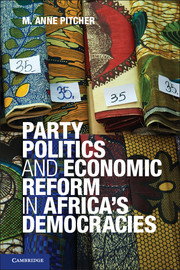Book contents
- Frontmatter
- Contents
- Tables, Figures, and Maps
- Acknowledgments
- Abbreviations
- Map
- 1 Understanding Institutional Development in Africa
- 2 From Motivational to Imperative Commitment
- 3 The Impact of Party Politics and Democratic Quality on Economic Reform
- 4 Party Fragmentation and Ad Hoc Private Sector Development in a Limited Democracy
- 5 Stable Parties, Limited Democracy, and Partisan Private Sector Development
- 6 Stable Parties, Liberal Democracy, and Strategic Compromise
- 7 Conclusion
- Appendix 1 Coding Scheme
- Appendix 2 Coding Scheme Indicators of Imperative Commitments
- Appendix 3 Effective Number of Parliamentary Parties (ENPP) in Nine African Democracies c. 1990s–2000s
- Bibliography
- Index
- References
2 - From Motivational to Imperative Commitment
Variation and Convergence of Private Sector Institutions across Africa
Published online by Cambridge University Press: 05 June 2012
- Frontmatter
- Contents
- Tables, Figures, and Maps
- Acknowledgments
- Abbreviations
- Map
- 1 Understanding Institutional Development in Africa
- 2 From Motivational to Imperative Commitment
- 3 The Impact of Party Politics and Democratic Quality on Economic Reform
- 4 Party Fragmentation and Ad Hoc Private Sector Development in a Limited Democracy
- 5 Stable Parties, Limited Democracy, and Partisan Private Sector Development
- 6 Stable Parties, Liberal Democracy, and Strategic Compromise
- 7 Conclusion
- Appendix 1 Coding Scheme
- Appendix 2 Coding Scheme Indicators of Imperative Commitments
- Appendix 3 Effective Number of Parliamentary Parties (ENPP) in Nine African Democracies c. 1990s–2000s
- Bibliography
- Index
- References
Summary
Introduction
Since the 1980s, many governments in Eastern Europe, Latin America, Asia, and Africa have designed new formal institutions to foster democracy, to reduce the role of the state, to build market economies, and to develop their private sectors. In many countries, the arrangements were not the product of incremental institutional evolution. Rather, they reflected deliberate choices made by governments to address economic crisis, control spending, court investors, or assuage popular protest. In some cases, conditions attached to loans by international financial institutions and donors forced countries to adopt new rules; other governments enacted new laws owing to pressures from social actors or the global diffusion of neo-liberal ideas.
The adoption of new formal institutions has raised interesting questions with respect to their contribution to the complex and contentious process of economic and political transition. Regardless of whether they are rational choice theorists or historical institutionalists, scholars of institutionalism have been especially concerned with the kinds of institutions governments have adopted; how governments have demonstrated their commitment to these institutions; and whether such commitments can be credible in the context of a country undergoing a multifaceted transition. Furthermore, scholars have sought to explain the dynamics and consequences of institutional development as well as whose interests are, or are not, served by particular institutional choices.
- Type
- Chapter
- Information
- Publisher: Cambridge University PressPrint publication year: 2012

